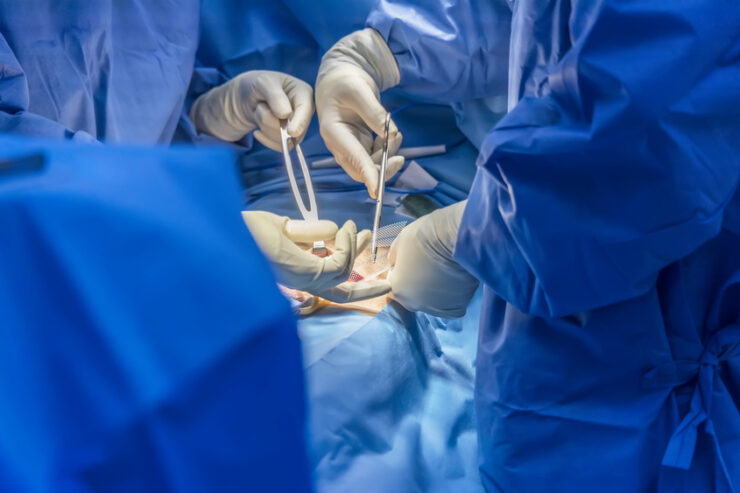FAQ
C-QUR Surgical Hernia Mesh Lawsuit
C-QUR hernia mesh, manufactured by Atrium Medical, is constructed of a unique fish-oil based coating which has been linked to high rates of infection. In addition, C-QUR products have also resulted in serious side effects and complications similar to other troublesome surgical mesh products.
Products that may be involved in C-QUR lawsuits include:
- C-QUR Mesh
- C-QUR Mosaic
- Vitamesh
- C-QUR Tacshield
- C-QUR V-Patch
- C-QUR CentriFX
- C-QUR FX Mesh
In many cases, complications of a hernia mesh implant will require hernia revision surgery. Atrium Medical has faced over 3,300 C-QUR Surgical Hernia Mesh Lawsuits for injuries caused by the mesh devices.
C-QUR Hernia Mesh Complications
Surgical mesh is a medical device used to stabilize tissues during a hernia repair surgery. It was used in almost all hernia repair surgeries until recently, when experts began advising against its use due to the high number of adverse events associated with the mesh.
C-QUR mesh is manufactured by Atrium Medical and employs a unique coating of fish oil surrounding a plastic mesh. The fish-oil based coating was intended to be a bioabsorbable film which would keep the mesh from touching internal organs. Use of the coating was claimed to minimize tissue adherence to mesh which would reduce complications common with other mesh products.
Unfortunately, the introduction of the fish-oil coating may not have worked as intended and may also have introduced other complications. Though studies reportedly showed that the coated surgical mesh had a “minimal inflammatory response”, it may have caused allergic reaction, inflammation and infection which was not common with other products.
“In one case, the patient reported that a surgeon had to remove previously healthy tissue, including previously healthy muscle tissue, because of the damage done by the C-QUR mesh, with the patient subsequently developing a life-threatening infection requiring prolonged hospitalization.”
Injuries and complications of C-QUR hernia mesh have included:
- Severe pain
- Abdominal infection
- Fistula formation
- Hematoma
- Inflammation
- Seroma
- Allergic reaction
- Mesh migration
- Bowel adhesion
- Bowel obstruction
- Intestinal or organ perforation
- Hernia recurrence
- Revision surgery to remove and/or repair mesh
In testing, C-QUR mesh has resulted in lower rates of mesh contraction, but this may not have been the result in real-life experience and problems associated with inflammation, adhesions and infection may significantly overshadow any benefits.
Instead of reducing inflammation as advertised, C-QUR’s fish oil coating may have resulted in a significant increase in immune response and adhesions around the mesh implants due to the inflammatory response.
C-QUR Hernia Mesh Recalls and FDA Involvement
Atrium Medical has been subject to a number of complaints and warnings involving the U.S. Food and Drug Administration (FDA), beginning in 2008.
Atrium’s manufacturing facilities were subject to FDA inspection four times from 2009 to 2013, resulting in the discovery of violations in 2009, 2010, 2012 and 2013, with at least one warning letter being issued. The Agency cited manufacturing conditions, sterility, and product defects and in 2013, after repeated failures to clean up the plants, the FDA and the U.S. Department of Justice worked to block Atrium manufacturing. The company later agreed to pay $6 million to settle issues included in the injunction.
Also in 2013, Atrium voluntarily recalled 145,000 C-QUR products including lots of C-QUR V-Patch, TacShield, Edge and other C-QUR mesh. The recall was issued over packaging concerns which may have exposed the products to high humidity for long periods of time, causing the product to stick to the inner sleeve of packaging.
Atrium’s parent company has stated that their surgical mesh business is discontinued and hernia mesh products will no longer be sold.
Atrium Medical C-QUR Surgical Hernia Mesh Lawsuits
Since 2016, over 3,300 federal C-QUR Hernia Mesh Lawsuits have been filed against Atrium Medical. Federal lawsuits were consolidated into multi-district litigation (MDL 2753) in the U.S. District Court for the District of New Hampshire and the company may face numerous lawsuits in state and local courts.
The first federal bellwether case for the C-QUR hernia mesh lawsuits was scheduled to be heard February of 2020. The court date was delayed due to the COVID-19 pandemic until July 2021; however, it was reported to have been settled out-of-court and the second bellwether trial date has never been set.
No settlement offer has been made public but Atrium’s parent company Getinge Group announced that it was setting aside $66 million to settle C-QUR lawsuits and the company has asked the court to set up a settlement fund. The company has also withdrawn C-QUR products and all surgical mesh from their business portfolio and will no longer sell the devices, but more lawsuits may be expected as complications continue to emerge.
People who received a C-QUR Atrium Medical Surgical Hernia Mesh implant and have experienced complications or required revision surgery, may be eligible for compensation.
